

IMPACT REPORT Black Reparations Project 2022-2024
WHY BRP?
DEAR READER,
The Black Reparations Project (BRP) is a collaborative initiative involving faculty, staff, and students from Mills College at Northeastern University (Oakland Campus) and U.C. Berkeley’s Goldman School of Public Policy. Our mission is to promote education and research on Black reparations policies and initiatives both within California and across the United States.
This mission is driven by a critical need to advance Black reparations learning, planning, policy, and action. The persistent disenfranchisement faced by Black people in America—a legacy of the institution of slavery—continues to produce enduring socioeconomic impacts that demand urgent and thoughtful solutions. In response to this need, and as state and local governments develop and implement formal reparations legislation, BRP stands ready to serve as a key partner within higher education, offering technical support and policy analytic expertise to ensure meaningful progress and sustainable change.
Grounded in the principles of joy, healing, love, and collective liberation, the Black Reparations Project cultivates opportunities for individuals to come together to study, discuss, and contribute to policy analysis supporting Black reparations.
By embracing these operating principles and programming goals, we hope to create a more just, equitable, and compassionate world for all individuals. Our approach is rooted in participatory action research (PAR), a collaborative and democratic method that generates relevant, restorative, actionable, and transformative knowledge for communities.
We focus on the research and analysis of reparations implementation, including planning considerations, challenges, and successes. BRP is dedicated to elevating the discourse around reparations by providing formal learning opportunities, supporting collaboration among movement leaders, and delivering rigorous academic and policy support.
Over the past few years, we have achieved significant milestones in our work, which are detailed in the following sections. We hoped to have published this report before now, however our initiative operates under a limited capacity. This journey would not be possible without the support of our partners, with special thanks to Mills College at Northeastern University (MCNU) and the Goldman School of Public Policy (GSPP). As we enter a new political season in 2025, we remain steadfast in advancing justice through our growing work and partnerships. While political landscapes may shift, our mission endures. Together, we will continue to build progress and keep the promise of reparations alive.
In Community,
Dr Ashley Adams, Director, MCNU
Ife Tayo Walker, Director of Events, MCNU
Dr Darcelle Lahr, Director of Curriculum, MCNU
Dr. Erika Weissinger, Director, GSPP
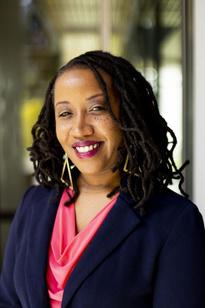

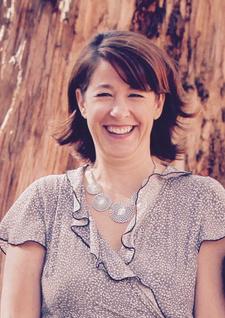
Black Reparations Project Directors
Dr. Ashley C. Adams (she/her), Director Mills College at Northeastern University - Associate Teaching Professor, Business & Social Sciences Unit, Elinor Kilgore Snyder Professorship, Office of the Dean Special Faculty Appointment for Strategic Initiatives, Black Faculty and Staff Association Co-Chair
Ife Tayo Walker (she/her), Director of Events Mills College at Northeastern University - Associate Director, Diversity, Equity and Inclusion, Campus Culture with Antiracism and Social Justice/DEI Committee Chair, Black Faculty and Staff Association Co-Chair, Black Student Collective Advisor
Dr. Erika Weissinger (she/her), Director Goldman School of Public Policy, University of California, Berkeley - Assistant Professor of Practice, Reparation Generation National Advisory Board & Evaluation Lead, Berkeley Unified School District Reparations Task Force Member, and Board Treasurer for Waterside Workshops, a non-profit providing vocational education and wraparound services for young people in the Bay Area
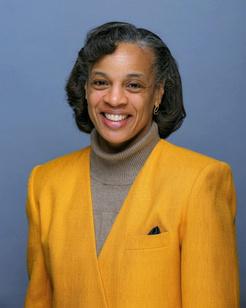
Dr. Darcelle Lahr (she/her), Director of Curriculum Mills College at Northeastern University - Professor of Practice, John and Martha Davidson Professorship, Northeastern University Elected Senator, Senate Agenda Committee, Faculty Antiracism & DEI Committee Chair, Black Faculty and Staff Association Co-Chair
BRP Fellows & Student Research Assistants
The Black Reparations Project Fellowship Program welcomes graduate students from various disciplines to study Black reparations-related topics. The BRP fellowship experience connects students with clients advancing reparations policy, including government offices, advocacy organizations, and elected officials. Fellows engage with reparations movement leaders, analyze reparations policy, and contribute recommendations to their clients. In addition to client project work, Fellows support and facilitate BRP events during the academic year. During 2022-24, we had the privilege of mentoring three outstanding fellows whose work advanced policy analysis, community engagement, and narrative-building, leaving a meaningful impact on the field.
Black Reparations Project Fellows
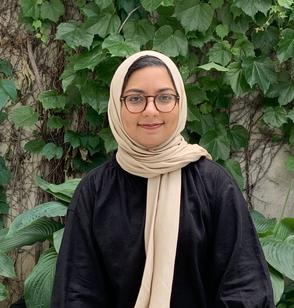
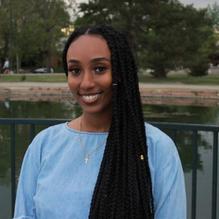
Sommer Iqbal (she/her), Master of Public Policy, 2024, a student at UC Berkeley’s Goldman School of Public Policy, focused her fellowship on local government-funded reparations Her project, "Local Reparations for a Just World," provided case studies and recommendations for local and state governments. Sommer’s dedication to racial and economic justice, as well as her leadership roles at UC Berkeley, made her an invaluable asset to the program.
Meklit Biliard (she/her), Master of Public Policy, 2023, also from UC Berkeley, worked on "Everybody Eat$: An Engagement and Education Strategy for California Reparations Initiatives." Her project highlighted the importance of community engagement in reparations initiatives. Meklit’s commitment to equity and inclusion, informed by her personal experiences, brought depth and compassion to her work.
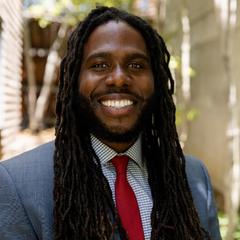
David Dixon (he/him), Master of Public Affairs, 2023, a graduate from UC Berkeley, developed "Black Reparations Donor Engagement Strategies." His background in history, Africana Studies, and community organizing informed his approach to engaging donors for reparations initiatives. David’s passion for advocacy and social justice resonated throughout his project.
We are incredibly proud of the work and contributions of our BRP Fellows. Their dedication, expertise, and passion have significantly advanced the mission of the Black Reparations Project, providing impactful research and practical solutions in support of reparations policies. To learn more about our Fellows program and to see their research papers, view here: https://reparations.sites.northeastern.edu/brp-fellows.
Black Reparations Project Research
Assistants
The Black Reparations Project was also fortunate to have the support of two dedicated Northeastern University Student Research Assistants over the past year. Their contributions have been invaluable in advancing our mission and supporting various projects.
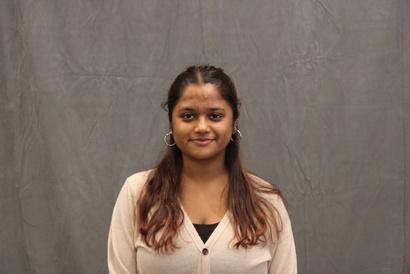
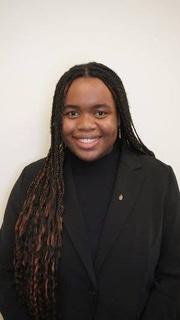
Shivangi Basu (She/Her), a candidate for a Master's in Political Science at the College of Social Sciences and Humanities, Northeastern University Boston, has research interests in restorative justice, gender, race and caste in policy, social change advocacy, foreign policy, global politics, and South Asian politics. Shivangi played a crucial role in building the BRP repository site and researching higher education reparations models, examining how colleges and universities are supporting the Black reparations movement. Additionally, she contributed significantly to the historical and archival research for the African American History and Engagement Project, sponsored by the California Department of Parks and Recreation and the California African American Museum, for the Colonel Allensworth State Historic Park. Starting in 2025, Shivangi will transition into her new role as a BRP Fellow, as she completes her capstone project.
Trina Madziwa (She/Her), a candidate for a Bachelor's in Cultural Anthropology and International Affairs with a minor in Africana Studies at the College of Social Sciences and Humanities, Northeastern University Boston , has research interests in Africana diasporic studies, community development, advocacy, cultural preservation, and restorative justice. Trina assisted with genealogy and descendant engagement research and prepared the final report from the 2023 BRP Conference. She also played a vital role in the historical and archival research supporting the African American History and Engagement Project, sponsored by the California Department of Parks and Recreation and the California African American Museum, for the Colonel Allensworth State Historic Park.
We are incredibly proud of the work and contributions of Shivangi and Trina. Their dedication, expertise, and passion have significantly advanced the mission of the Black Reparations Project, providing impactful research and practical solutions in support of reparations policies.
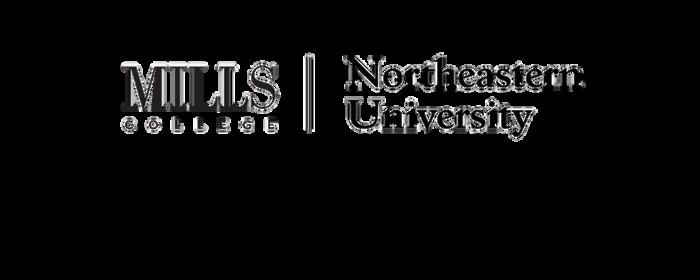


Impact Report

KEY MILESTONES 2022-24
The Black Reparations Project (BRP) is a collaborative initiative between Mills College at Northeastern University and UC Berkeley's Goldman School of Public Policy. Our mission is to advance education, research, and action on Black reparations policies and initiatives at local, state, and national levels.
Provided technical support to local and state reparations efforts with research and analysis contributions from student fellows and research assistants
Designed innovative reparations curriculum for university students and community youth
Hosted historic California State Reparations Task Force Public Hearing
Conducted community listening sessions, hosted public testimony forums, organized 10+ public education events, and participated in national conferences and multiple expert panels
Authored two reports, summarizing key themes from reparations conferences and listening sessions
Launched a public-facing reparations repository housing over 70+ resources
Reparations Conference Attendees
Reparations Task Force Public Hearing Attendees
Resources in BRP Repository

“We have a hope deficit from all of the things that we ' ve experienced…But we have plenty of evidence that it can happen, and that it will happen.”
-- Tinisch Hollins, Vice Chair, San Francisco African American Reparations Advisory Committee (BRP Conference Report, 2023)
BLACK REPARATIONS: Making the Case for
The Unfinished Business of Reconstruction
Although California was a free state, slavery was practiced in the state. Between 1850 and 1860, over 4,000 enslaved African Americans were forcibly brought to the state to work in gold mines for their white enslavers. These individuals labored without pay and were often deceived with false promises of freedom. California's admission to the Union in 1850 was defined by conflicting policies and perspectives on Black migration and labor. Discriminatory laws governing housing, land, and employment reinforced systemic exclusion, limiting opportunities for African Americans despite their contributions to the state’s development. These historical injustices laid the foundation for the deep racial disparities that persist in California and across the nation today.
In 2021, former Assemblywoman Shirley Weber introduced AB 3121, aimed at establishing a task force to investigate and recommend reparations proposals. The objective was to address the enduring effects of slavery on African American residents of California. Serving as a national model, the California Reparations Task Force was the first of its kind on a statewide level. In July 2023, the task force delivered their final report and recommendations to the California legislature. The report identified 12 specific areas that descendants of U.S. chattel slavery have suffered harm, as follows: 1) Enslavement, 2) Racial Terror, 3) Political Disenfranchisement, 4) Housing Segregation and Unjust Property Takings, 5) Separate and Unequal Education, 6) Environmental Racism, 7) Pathologizing of African American Families, 8) Control over Creative, Cultural, and Intellectual Life, 9) Stolen Labor and Hindered Economic Opportunity, 10) Unjust Legal System, 11) Mental and Physical Harm and Neglect, and 12) Wealth Gap.
The final report also provides recommendations for California policymakers, encompassing a variety of proposed measures. These suggestions specify eligibility criteria for reparations, recommended payment amounts based on different conditions, and other forms of reparative justice through policy changes and educational initiatives.
Across the United States, local, state, and regional governments have established reparations task forces, commissions, and committees to address the lasting impacts of slavery’s historical injustices and systemic racism. These groups play a critical role in advancing reparative justice through research, policy recommendations, and community engagement. The following list (See Fig. 1) highlights initiatives actively working to create meaningful change and promote reparative justice in their respective regions.
Figure 1
Reparations Task Forces, Commissions, and Committees
Alameda County Reparations Commission 1.
Amherst, Massachusetts African Heritage Reparation Assembly 2
Asheville, North Carolina Community Reparations Commission 3 Berkeley Unified School District Reparations Task Force 4
Boston, Massachusetts Task Force on Reparations 5 Burlington, Vermont Reparations Task Force 6 California Legislative Black Caucus 7. California Reparations Task Force 8. City of Hayward – Russell City Reparative Justice Project 9.
Detroit, Michigan City Council Reparations Task Force 10.
Evanston, Illinois Reparations Committee 11.
Fulton County, Georgia Reparations Task Force 12.
Greenbelt, Maryland Commission to Study and Develop Local Reparations Proposals 13. Kansas City, Missouri Commission on Reparations Committee 14.
Los Angeles Reparations Advisory Commission 15.
New York State Community Commission on Reparations Remedies 16.
Northampton Reparations Study Commission 17.
Providence, Rhode Island Municipal Reparations Commission 18.
Saint Paul, Minnesota Recovery Act Community Reparations Commission 19
San Francisco African American Reparations Advisory Committee 20
State of Illinois African Descent-Citizens Reparations Commission 21
St Louis, Missouri Reparations Commission 22
Historically, the U.S. reparations movement has its roots in the era of Reconstruction following the Civil War (See Table 1). While the case for reparations has gained more recognition and some political support in recent years, it remains a deeply divisive issue. Many argue that reparations are necessary to correct centuries of racial injustice, while others believe that such payments would be unfair or impractical. The foundation of the United States includes rooted narratives that devalue Black identities. Demeaning narratives about Black identifying people, portraying them as less than human and undeserving of reparative justice, has served as rationale for anti-Black racism since slavery. These pervasive narratives have impacted the lives of Black individuals in all societal facets.
African American Reparations Timeline
Time Period Reparations
Reconstruction Era (1865-1877)
Early 20th Century (1900’s1930’s)
Civil Rights Era (1954-1970’s)
Late 20th Century (1980’s-1990’s)
Early 21st Century (Early 2000’s)
Present Day (2021-2023)
Post U S Civil War, the idea of reparations can be found in General T Sherman’s (1865) Special Field Order No 15, which allocated “forty acres and a mule” to freed enslaved people The order was later reversed by President Andrew Johnson and the lands were returned to their previous owners after President Abraham Lincoln’s assassination Some enslavers were paid reparations for the financial loss of enslaved people, while the freed people received no reparations at all.
African American leaders such as Callie House, and organizations like the National Ex-Slave Mutual Relief, Bounty, and Pension Association sought pensions for formerly enslaved people Additionally, the Black Nationalism and Back-to-Africa Movement, promoted by Marcus Garvey and the Universal Negro Improvement Association (UNIA), gained momentum
Groups like the Nation of Islam and individuals like Malcolm X brought further attention to the case for reparations In 1969, James Forman published the Black Manifesto and demanded reparations totaling $500 million from various U S religious organizations
In the late 80’s and early 90’s Congressman John Conyers introduced H R 40, a bill that proposed to establish a Commission to Study and Develop Reparations Proposals for African Americans Although the bill did not pass, Conyers reintroduced it every session until his retirement in 2017.
The movement gained new momentum in the early 2000’s In 2001, the United Nations World Conference Against Racism, Racial Discrimination, Xenophobia, and Related Intolerance acknowledged that the transatlantic slave trade was a crime against humanity and reparations should be considered. In 2014, the Atlantic published Ta-Nehisi Coates’ “The Case for Reparations.” The article significantly shaped discussions on racial issues and perspectives on Black reparations in the U.S.
Rep Sheila Jackson Lee took up Conyers’ mantle and reintroduced HR 40 At the state and local level, there have been initiatives aimed at reparations, see Fig. 1. In 2020, the city of Evanston, Illinois, approved the first reparations fund aimed at compensating Black residents for the lasting impacts of slavery and segregation. Table 1
SpecialTribute
CONGRESSWOMAN SHEILA JACKSON LEE (1950 -2024)
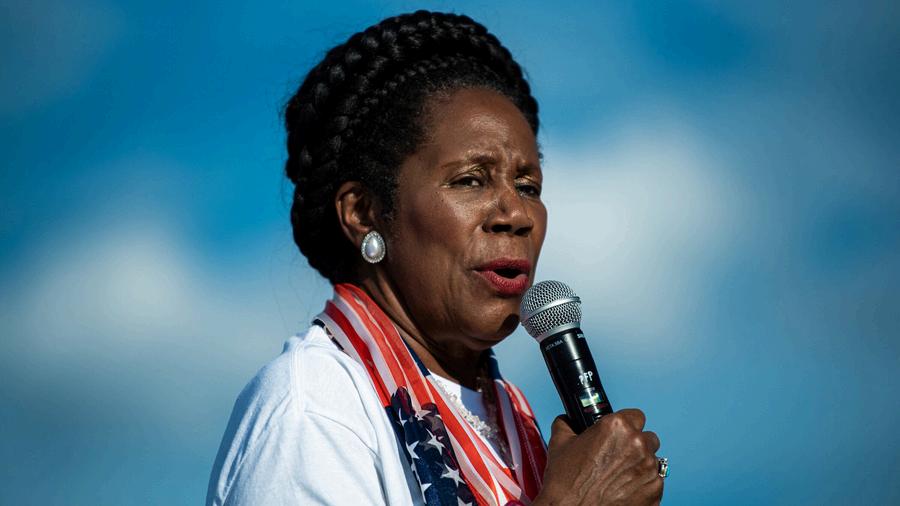
The Black Reparations Project team was saddened to learn of the passing of Congresswoman Sheila Jackson Lee. She was a tireless advocate for justice, equity, and reparative justice throughout her career and she truly was our Shero. As a leading voice in the ongoing fight for reparations, she has carried the torch lit by past generations, most notably through her unwavering commitment to advancing H.R. 40. Her work extends beyond H.R. 40. As a powerful advocate for civil rights, social equity, and justice for marginalized communities, Congresswoman Jackson Lee consistently pushed the boundaries of what is possible in the halls of Congress. Standing at the forefront of efforts to acknowledge and address the deep, historical harms of slavery and systemic racism in America, she refused to let these critical issues fade from national discourse and will forever be an inspiration in our hearts and minds.
Congresswoman Jackson Lee reminded us that reparations are not merely a financial transaction but a profound moral reckoning, one that demands courage, honesty, and an unwavering commitment to healing. Her leadership inspires us all to work toward a more just and equitable society, where the legacies of slavery and systemic racism are addressed with the gravity they deserve.

We honor Congresswoman Sheila Jackson Lee for her steadfastness, her leadership, and her unwavering commitment to justice. Her work has laid the foundation for future generations to continue the fight for reparations and racial equity, and for that, we are deeply grateful.
Rest in Peace and Power
Congresswoman Sheila Jackson Lee
BRP PROGRAMMING
2022-24
Advancing Reparative Justice Through Higher Education
Colleges and universities--especially historically white universities--must reckon with their past and current policies to build a Culture of Repair internally first and foremost. Higher education institutions' are uniquely positioned–-given their significant financial resources, research capacity, and historical connections to slavery–to take on the deep work of racial repair for the harm they have exacted on Black Americans. Moreover, they can leverage their research capacity and the experience of their staff to directly support local reparations and truth-telling efforts in their communities. Over the past two years, the Black Reparations Project Team partnered with Liberation Ventures’ Vikas Maturi to propose five pathway points for colleges and universities to better support the reparations movement, as follows:
Figure 2
Higher Education Reparative Justice Pathways
1
Engage in Anti Racism, Diversity, Equity, Inclusion, and Belonging (ADEIB) work
As an enabling condition to build fluency with talking about race and oppression
3 Take an active institutional stance on repair work and the modern reparations movement
5
Invest resources in projects that directly support the reparations movement such as policy and law clinics, public education, curriculum development, community engaged research, etc...
2
4
Study and acknowledge the racial history of the institution
including on the origins of the endowment, racist policy decisions, and anit-racist organizing efforts
Implement a set of tailored reparative policies at the institution that are informed by the harm the institution caused and driven by evaluative criteria
The following BRP sponsored events and engagements outline our approach in navigating the Higher Education Reparative Justice Pathways over the past few years:
The Black Reparations Conference took place on February 24, 2023, online via Zoom. The aim of the conference was to serve as an educational platform and networking hub for individuals involved in the study, advocacy, proposal, and implementation of reparations policies. For further insights and detailed discussions, see the conference reports: Black Reparations Listening Sessions: A Summary of Pre-Conference Insights (Summer 2023) and Learning, Challenges, and Strategies in the Northern California Movement for Black Reparations and Beyond (Summer 2023).
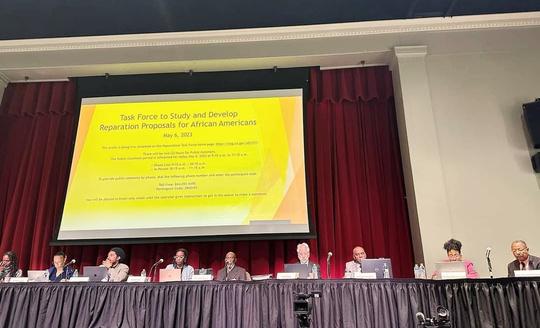
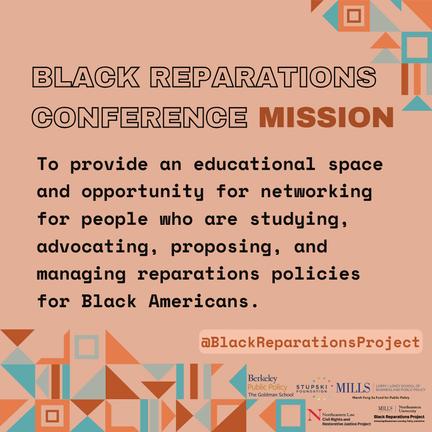
The Black Reparations Project hosted the historic California State Reparations Task Force Public Hearing #15 on Saturday, May 6th, 2023, at Lisser Hall, Northeastern Oakland Campus. This historic gathering concluded with the task force voting to endorse proposals for California to formally acknowledge and apologize for slavery and to provide reparations to Black descendant Californians for generations of economic harm and discrimination. For additional details, see the meeting recording and minutes.
Congresswoman Barbara Lee, a cherished Mills College Alumna from the class of 1973 and former Black Student Union President, was present and spoke during the public comments, calling for reparations legislation at the state and federal levels and underscoring the moral and societal imperative of reparations.
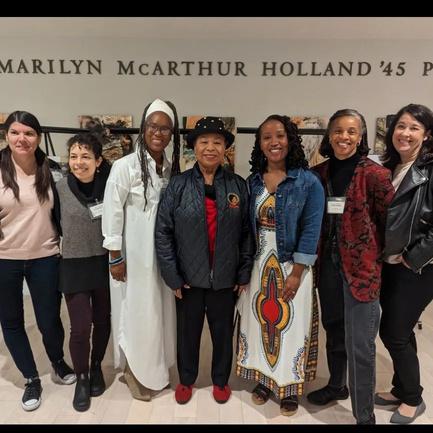
Images: (Top Right) 2023 Black Reparations Conference Flyer; (Middle Left) CA Reparations Task Force Members in Lisser Hall, and (Bottom Right) BRP Team with Congresswoman Barbara Lee
The following BRP sponsored events and engagements outline our approach in navigating the Higher Education Reparative Justice Pathways over the past few years:
Clarifying Reparations: Elevating Repair in Higher Education, Conference for Corporate and Foundation Relations Officers (CASE), San Francisco, California, May 2023. BRP Directors, Dr. Ashley Adams, Dr. Erika Weissinger, and Ife TayoWalker presented BRP’s reparative approach. Moderated by Vikas Maturi, Chief of Staff at Liberation Ventures, the session highlighted the vital role of academic institutions in reparative efforts. The panelists emphasized addressing institutional racial histories and adopting policies for effective reparative justice in higher education and beyond.
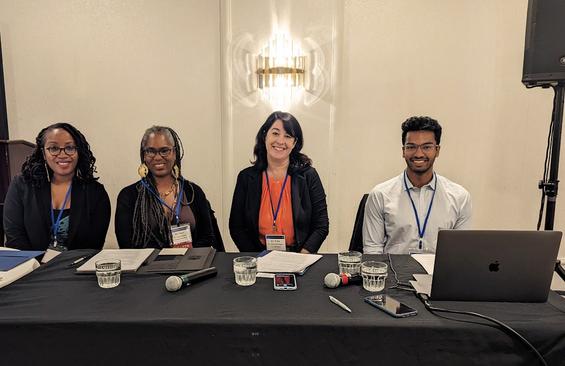
UC Berkeley Reparations Panel
Discussion: Connecting Local, State, and Federal Policy Supporting Black Reparations, Goldman School of Public Policy Alumni Conference in Berkeley, California, September 2023. This panel featured a comprehensive discussion on connecting local, state, and federal policies supporting Black reparations. The panel, emceed by Dr. Ashley Adams and moderated by Dr. Erika Weissinger, included prominent figures who explored the legislative landscape, the importance of crossracial alliances, and practical aspects of funding reparations efforts. Listen to the panel recording here

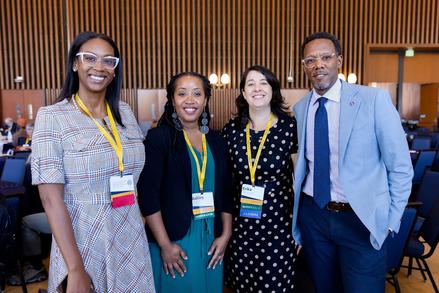
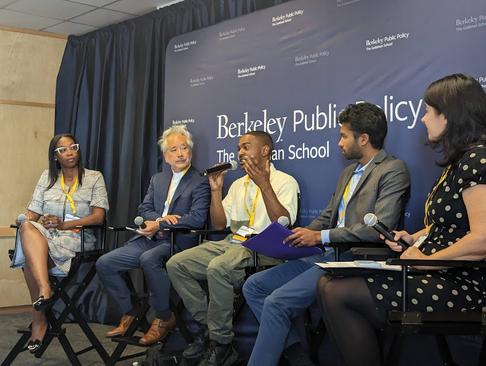
Images: (Top Right) The Westin Hotel CASE Conference location, (Middle Left) BRP and LV team at 2023 CASE Conference Panel Session, (Middle Right) BRP Team with CA Reparations Task Force Chair Kamilah Moore and GSPP Dean David Wilson, (Bottom Right) Dr. Erika Weissinger with Panelist, CA Reparations Task Force Chair Kamilah Moore, CA Reparations Task Force Member Don Tamaki, GSPP Alum and Former City Richmond City Councilman Demlus Johnson, and LV Chief of Staff Vikas Maturi
The following BRP sponsored events and engagements outline our approach in navigating the Higher Education Reparative Justice Pathways over the past few years:
Reparations and Land-Based Justice Fireside Chat, Sara Shallenberger Brown Cultural Landscapes and Sites Symposium at the University of Virginia School of Architecture in Charlottesville, Virginia, September 2023. This panel featured a discussion led by UVA Associate Professor of Urban + Environmental Planning and Director for the Center for Cultural Landscapes, Dr. Andrea Roberts, with panelists Associate Professor Of Women, Gender & Sexuality, Dr. Tiffany King and BRP Director, Dr. Ashley Adams. They explored the intersections of Black and Indigenous histories, land acknowledgements, and reparative justice for historic Black towns such as Nicodemus, Kansas, and Tulsa, Oklahoma. The event highlighted the importance of preserving these communities through shared stories, ancestral research, and modern preservation efforts. Panelists emphasized the need for continuous participatory work with descendants and the use of technology to support the reparations movement.
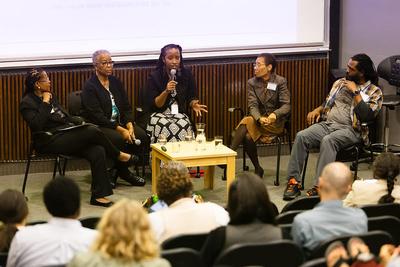
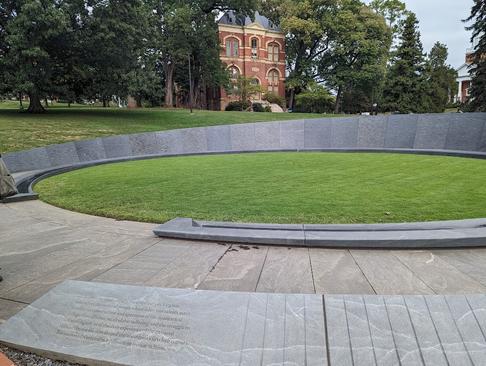
New Frontiers in Black Placemaking, Sara Shallenberger Brown Cultural Landscapes and Sites Symposium at the University of Virginia School of Architecture in Charlottesville, Virginia, September 2023. This panel featured BRP Director, Dr. Ashley Adams, Allensworth Progressive Association President, Denise Kadara, Historian, Dr. Timothy E. Nelson, and Kansas State Landscape Architecture and Regional & Community Planning Professor, La Barbara James Wigfall, and was moderated by Dr. Andrea Roberts. The symposium explored the historical and contemporary significance of Black Western settlements such as Nicodemus, Kansas; Blackdom, New Mexico; and Allensworth, California. African American descendant activists, planners, preservationists, and scholars shared their efforts to preserve these communities and address historical injustices. The event highlighted the ongoing struggle for reparative justice and the envisioning of Black futures within these emancipatory landscapes. View the panel recording here.
Images: (Left) Dr. Ashley Adams and Panelist at UVA, Photo by Tom Daly, (Right) UVA Memorial to Enslaved Laborers
The following BRP sponsored events and engagements outline our approach in navigating the Higher Education Reparative Justice Pathways over the past few years:
Legacy of Courage: A Pictorial Journey of Black History at Northeastern University, Oakland. During the 2024 Black History Month Founders Feast at Northeastern University Oakland campus, Dr. Ashley Adams presented "Legacy of Courage: A Pictorial Journey of Black History at Mills College and Northeastern University." The theme was Sankofa, highlighting the importance of remembering the past to shape a better future. See the presentation summary and slides here.
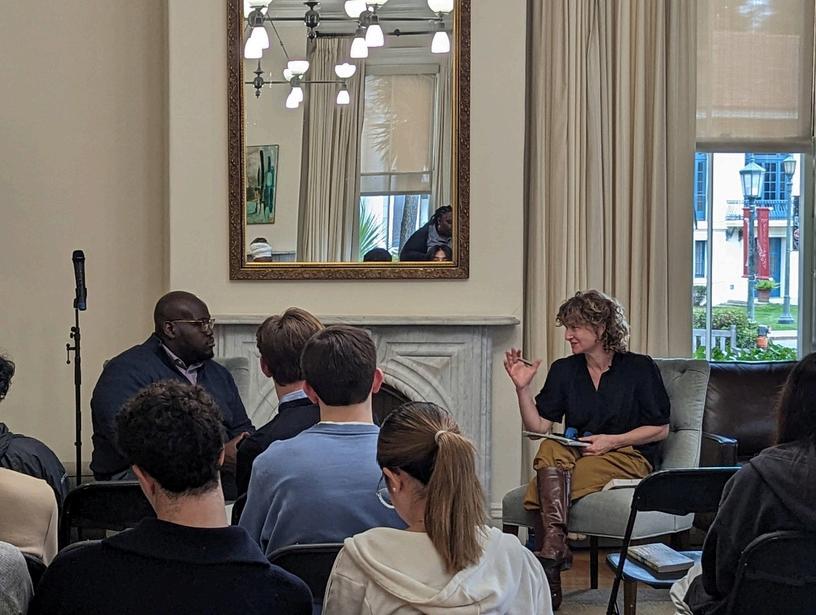
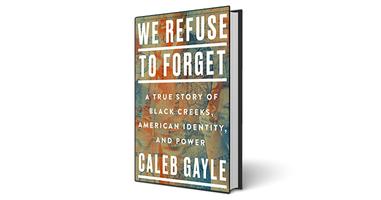
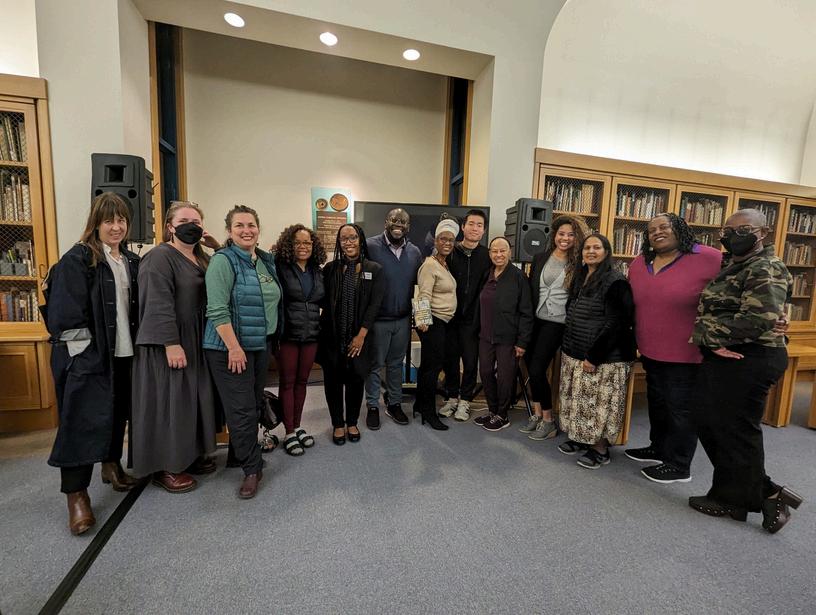
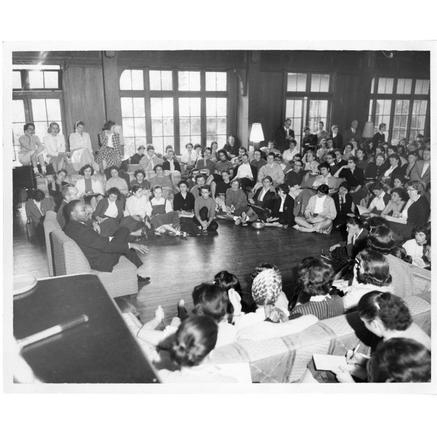
The Black Read, With Caleb Gayle, Northeastern University, Oakland. The Black Reparations Project hosted an engaging event featuring award-winning journalist Caleb Gayle, who presented his book We Refuse to Forget in the Heller Room at the F.W. Olin Library on Northeastern University’s Oakland campus as part of MCNU’s 2024 Black History Month series, The Black Read. The book explores the Creek Nation, a Native tribe that once owned slaves and accepted Black people as full citizens, challenging assumptions about identity and revealing the ongoing impacts of white supremacy on Black Americans. While on campus, Gayle also met with students in FirstYear Writing and Advanced Writing courses, to discuss race, identity, and storytelling. NU Professor Caleb Gayle, renowned for his work on race and identity, is a fellow at prestigious institutions such as New America, PEN America, the Harvard Radcliffe Institute of Advanced Studies, and New York University. View Caleb’s enlightening talk here.
Images: (Top Right) Dr. Martin Luther King, Jr. speaking to students--Mills College Student Union, Willis Studios, Oakland, California, February 20, 1958 and (Bottom Left) Caleb Gayle and book “We Refuse to Forget”
The following BRP sponsored events and engagements outline our approach in navigating the Higher Education Reparative Justice Pathways over the past few years:
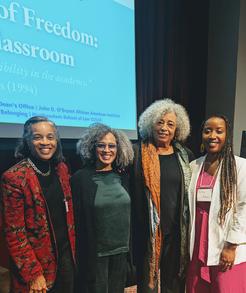
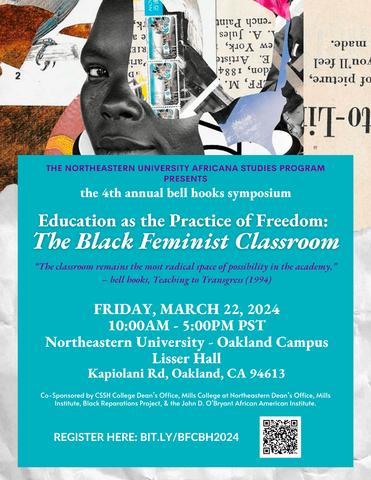
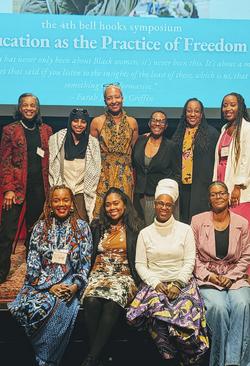
Bell Hooks Symposium – “Education as the Practice of Freedom: The Black Feminist Classroom,” Northeastern University, Oakland, March 2024. This event, organized and founded by NU’s Africana Studies Program (Dr. Regine Jean-Charles, and colleagues from the Northeastern Boston campus) in honor of bell hooks and inspired by her influential work Teaching to Transgress, brought together d scholars and engaged the community in critical ons on racial and gender justice in education. The um featured distinguished keynote speakers, Dr. Angela Distinguished Professor Emerita at the University of ia, Santa Cruz, and Dr. Gina Dent, Associate Professor of t Studies at the University of California, Santa Cruz, who d profound insights into the role of education in ng social justice. The event also included a panel on, moderated by NU Assistant Adjunct Professor Dr. llen Smith, featuring UC Berkeley Associate Professor of hy Dr. Brandi Summers Thompson and other esteemed s of the Northeastern University network, cultivating a logue on Black feminist thought and the urgency of about racial and gender justice in the 21st century. event recording here.
and BRP Student Research
Assistants provide research consulting services for the African American History and Engagement Project, sponsored by the California Department of Parks and Recreation and the California African American Museum, for the Colonel Allensworth State Historic Park. The resulting 90+ page paper prepared in Spring 2024, will be published as an official project document in the coming years. This groundbreaking research resonates deeply with reparations through reparative preservation by emphasizing the importance of truth-telling within the state preservation systems.
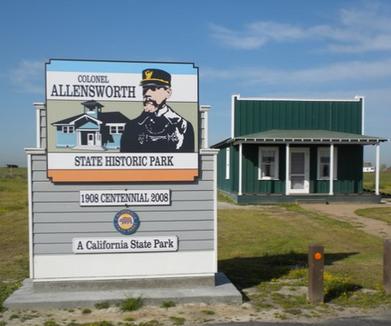
Images: (Bottom Right) Colonel Allensworth State Historic Park Sign
The following BRP sponsored events and engagements outline our approach in navigating the Higher Education Reparative Justice Pathways over the past few years:
In March 2024, BRP Directors, Dr. Ashley Adams and Dr. Erika Weissinger, in collaboration with the Rising Communities nonprofit advocacy organization, successfully developed and delivered a comprehensive virtual reparations curriculum for youth aged 15-18 from Los Angeles, CA. Titled "Journey of Justice: Exploring the Black Reparations Movement," this course engaged over 20 young participants in an exploration of the history and present-day efforts of the Black reparations movement. The curriculum included interactive sessions such as mock reparations hearings and civic engagement training, which helped students understand racial identity construction, significant chapters in African American history, and historical reparations policies. This initiative not only deepened the participants' understanding of reparative justice but also empowered them to become advocates for change.
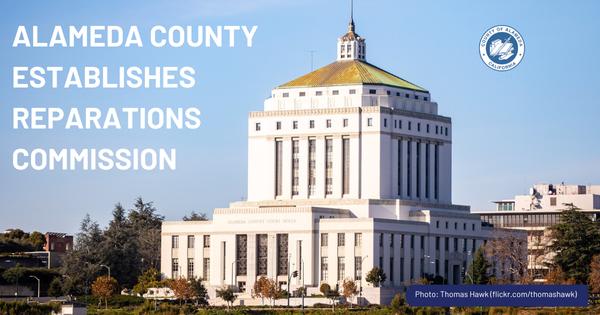
BRP supports the Alameda County Reparations Commission through expertise testimony and student research coordination. Dr. Ashley Adams and Dr. Erika Weissinger presented an overview of local reparations frameworks, historical context, and policy pathways at an official Commission meeting September 26th, 2024. Additionally, BRP facilitates student research efforts, contributing to the Commission's initiatives with analysis on reparative strategies, further advancing reparative justice at the local level.
The Black Reparations Project supports the Berkeley Unified School District Reparations Task Force, contributing policy insights, community engagement strategies, and funding recommendations. Dr. Erika Weissinger, who served on the Task Force, and Dr. Ashley Adams presented case studies and emphasized reparative justice in education. BRP also hosted CA Task Force Chair Kamilah Moore for a community dialogue session on reparations. Dr. Weissinger also led the Task Force Survey, securing support for an $8 million annual tax funding scholarships, harm reports, and curriculum development. Read the final report here.
(Middle Left)
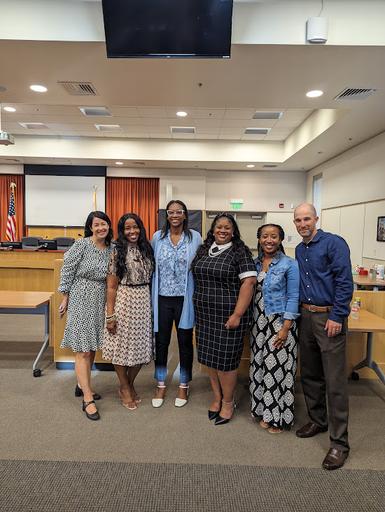
Images:
Alameda County Establishes Reparations Commission, Oakland Voices, September 12th, 2023 and (Bottom Right) BRP Team with CA Reparations Task Force Chair Kamilah Moore, BUSD Superintendent Dr Enikia Ford Morthel, BUSD Board President Ka’Dijah Brown
The following BRP sponsored events and engagements outline our approach in navigating the Higher Education Reparative Justice Pathways over the past few years:
In May 2024, Dr. Erika Weissinger, was featured as speaker at the “Reparations from California to DC” event, co-hosted by the DC Justice Lab and the University of California Washington Center. The event aimed to foster dialogue between reparations experts from California and stakeholders in Washington, D.C., exploring strategies to advance reparative justice initiatives. The program highlighted California’s recent legislative progress in reparations, positioning it as a potential model for other states and jurisdictions, including the District of Columbia. The event included a mix of presentations, discussions, and networking opportunities to facilitate knowledge exchange. Weissinger gave a TED-style talk examining the role of municipal-level reparations in establishing precedents for broader state and national reparations efforts. She highlighted the work being conducted by Berkeley Unified School District as part of local initiatives, drawing insights from her community to illustrate the critical need for racial repair at all levels.
Additional speakers (pictured below) included Mark Brown (California State University, Sacramento), who proposed a transitional justice model, and Giuliana Perrone (UC Santa Barbara), who explored lawsuits in which emancipated people sought to have their enslavers’ bequests honored. Additional presentations were given by Rekai Rusinga (UC Davis), who analyzed lessons from South Africa’s reparations efforts, and Kyle Mays (UCLA), who advocated for urban reparations policies focused on land returns for Black and Indigenous communities. Temi F. Bennett facilitated a discussion, encouraging attendees to exchange ideas and strategies for advancing reparative justice initiatives. This event highlighted the intersection of academic research and policy development, with a particular focus on applying lessons from California’s reparations efforts to inform initiatives at the local and national levels.
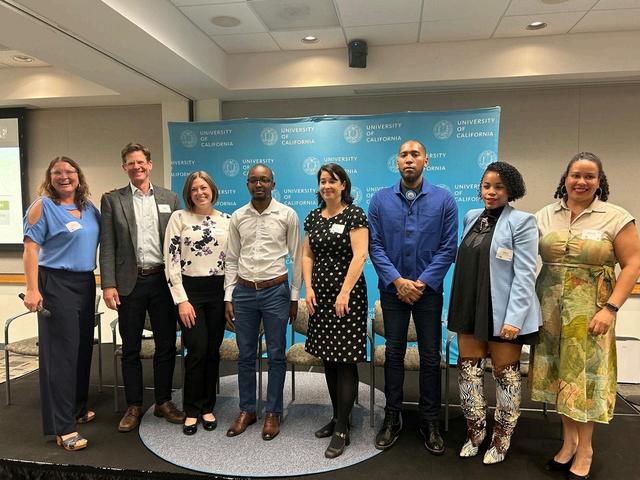
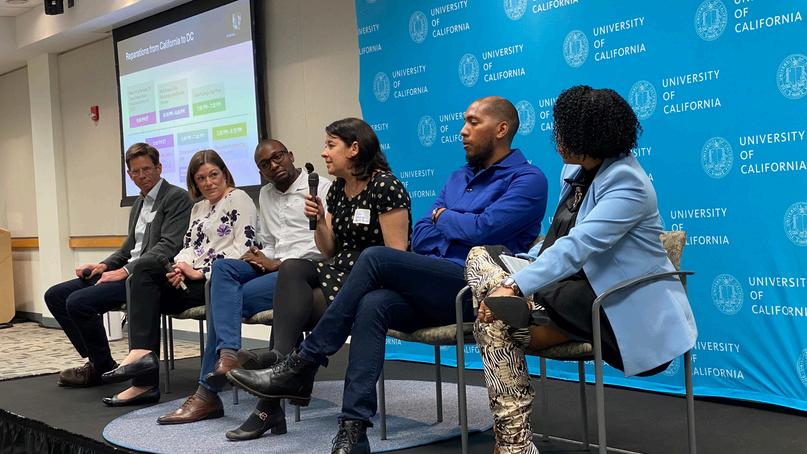
Images: (Left and Right) Dr. Erika Weissinger with “Reparations from California to DC ” speakers
The following BRP sponsored events and engagements outline our approach in navigating the Higher Education Reparative Justice Pathways over the past few years:
Advancing Narrative Change for Reparations: Engaging Academic Partnerships, Bay Area Regional Health Inequities Initiative (BARHII) Government Informational, Sacramento, California, May 2024. This one-day conference for government and community partners included a BRP-sponsored session on the crucial role of colleges and universities in supporting Black reparations through education, historical research, and policy analysis. BRP Director Dr. Ashley Adams presented strategies for engaging academic institutions in reparative efforts and showcased various initiatives, including historical research, community-driven surveys, and public education events.
The Black Reparations Project gathered data on how colleges and universities are supporting the reparations movement, identifying 13 central themes in support efforts. Data collection methods included BRP Student Research Assistants, examining over 100+ websites of public and private institutions studying slavery or engaging in reparations work, reviewing websites and reports of reparations commissions, committees, and task forces, and investigating reparations-related repositories. The presentation underscored the importance of academia in reshaping narratives, acknowledging historical injustices, and advancing
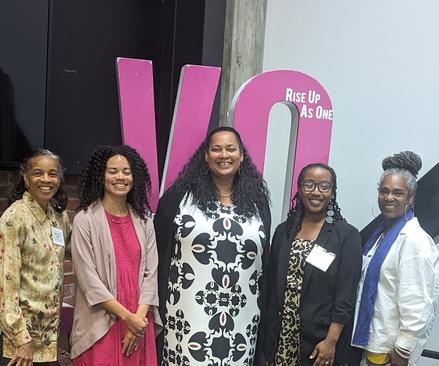
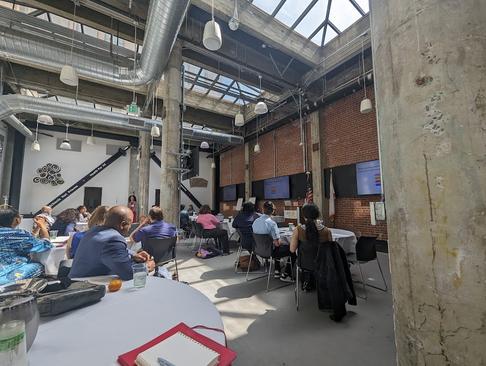
Images: (Left) BRP Directors with BARHII Executive Director - Melissa Jones and Director of Health Repair - Kelsey Lyles and (Right) CA Government Agency meeting attendees
The following BRP sponsored events and engagements outline our approach in navigating the Higher Education Reparative Justice Pathways over the past few years:
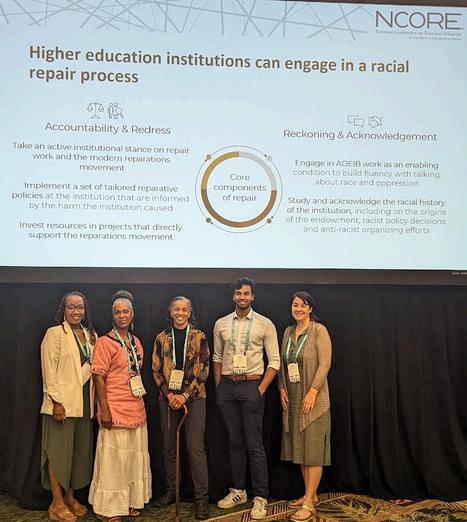
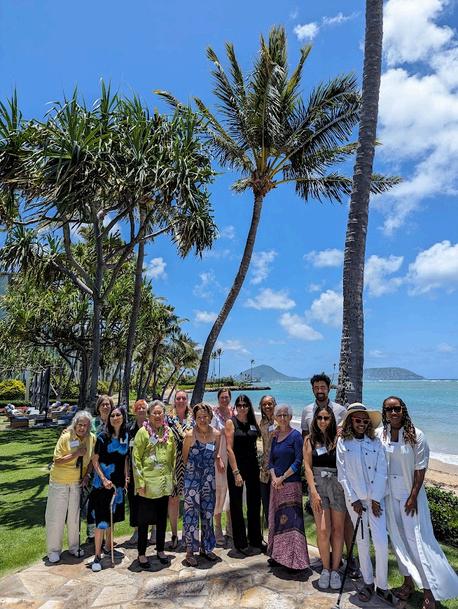
Clarifying Reparations: Elevating Repair in Higher Education, National Conference on Race and Ethnicity in Higher Education (NCORE), Honolulu, Hawaii, May 2024. BRP hosted a conference session moderated by Vikas Maturi, Chief of Staff at Liberation Ventures. In the session, BRP Directors, Dr. Ashley Adams, Dr. Erika Weissinger, Ife Tayo-Walker, and Dr. Darcelle Lahr highlighted five key pathways for universities to support reparations. The discussion emphasized the role of higher education institutions in advancing reparative justice through various initiatives and strategies and debuted the new BRP repository on Reparative Efforts in Higher Education. Additionally, while in Honolulu, Dr. Adams and Dr. Lahr joined Mills College Alumnae and Mills College at Northeastern University Dean Beth Kochly for a brunch at the Wal’alae Country Club.
Juneteenth Celebration: Understanding Today’s Reparations Movement, Northeastern University John D. O’Bryant African American Institute, June 2024. This panel featured several distinguished speakers, including Dr. Ashley Adams and was moderated by Dr. Régine Jean-Charles, Dean’s Professor of Culture and Social Justice and Director of Northeastern University Africana Studies. The panelists discussed the historical and ongoing impacts of slavery and systemic racism, examining efforts at various levels of government and within institutions to address these injustices. View the panel recording here.
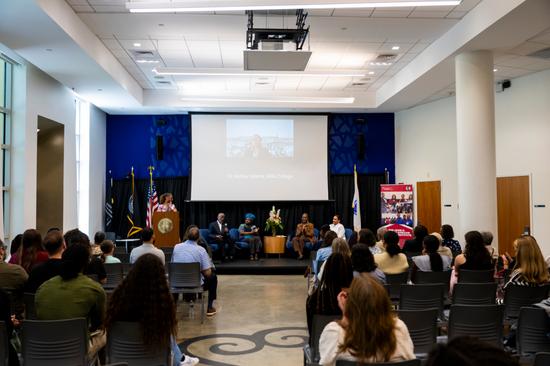
Images: (Top Left) BRP and LV team at 2024 NCORE Session, (Middle Left) BRP Team with Beth Kochly and Mills College Alumnae (Bottom Right) 2024 Northeastern University Juneteenth Panel
The following BRP sponsored events and engagements outline our approach in navigating the Higher Education Reparative Justice Pathways over the past few years:
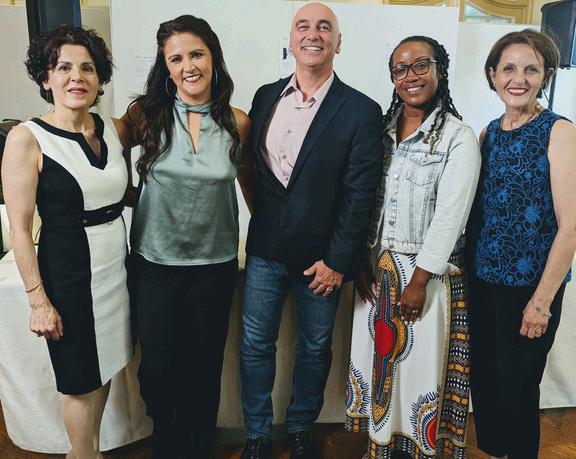
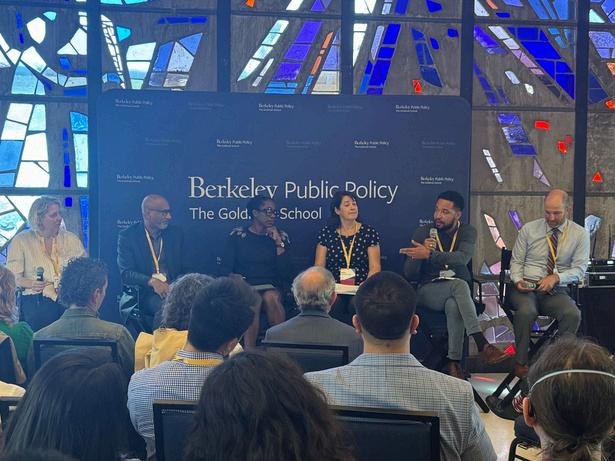
Inclusive Dialogues: Race, Gender, and the Journey to Equality, Foothill-De Anza Center For Applied Humanities, June 2024. Dr. Ashley Adams participated in a panel discussion moderated by Dr. Tony Kashani, Public Speaking and Critical Diversity Studies Professor at USF, alongside esteemed scholars Maryam Daha, Adjunct Faculty at Foothill College Child Development and Education Department; Dr. Nicole Gonzalez Howell, Associate Professor at the University of San Francisco; and others. The panel explored the role of higher education institutions in advancing racial and gender healing and justice, emphasizing inclusive dialogues as a tool for social transformation. View the panel recording here.
Racial Repair: Race-Neutral Laws, Racial Equity Goals, Goldman School of Public Policy Alumni Conference in Berkeley, California, September 2024. Dr. Erika Weissinger led a panel on Racial Repair: Race-Neutral Laws, Racial Equity Goals at the Goldman School of Public Policy's Second Annual Alumni Conference. The discussion featured Doug Austin, Founder and CEO of UPD Consulting; Kad Smith, Facilitator of the Berkeley Unified School District Reparations Task Force; Joshua R. Daniels, Chief of Policy and Governance Technology Services at the California School Board Association; Meshie Knight, U.S. Racial Justice Director at the David and Lucile Packard Foundation; and Ann Willemssen, Founder and Principal Consultant of Shift Forward Consulting. Panelists explored innovative approaches to reparative justice, including initiatives like the Home for Good program and the Berkeley Unified School District's reparative policies. The conversation emphasized the importance of community engagement, strategic philanthropy, and systems-level change in advancing racial repair. Additionally, Dr. Weissinger highlighted BRP’s coordinated student research support for the Alameda County Reparations Commission, advancing collaborative scholarship and policy analysis.
Images: (Top Left) Dr. Adams with Inclusive Dialogues Panelists and (Bottom Left) Dr. Erika Weissinger with Racial Repair Panelists
The following BRP sponsored events and engagements outline our approach in navigating the Higher Education Reparative Justice Pathways over the past few years:
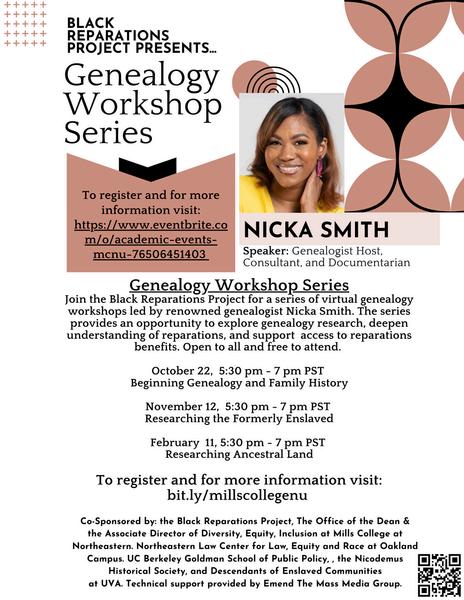
The Black Reparations Project Presents: Genealogy Workshop Series October 2024–February 2025, online via Zoom. This Genealogy Workshop Series offers participants tools and resources to explore their family histories while connecting personal narratives to broader historical and social justice contexts. Led by renowned genealogist Nicka Smith, the workshops equip attendees with essential skills in historical research, archival documentation, and understanding the role of genealogy in reparative justice efforts.
The series began in October 2024, with the session "Beginning Genealogy and Family History." This workshop introduced participants to the basics of genealogy research, offering strategies for tracing ancestors of both free people and the formerly enslaved. In November 2024, the second workshop, "Researching the Formerly Enslaved," provided participants with critical tools to overcome historical barriers in tracing enslaved ancestors. The session focused on three essential record sets Civil War Records/Pensions, the Freedmen’s Bureau, and Probates/Successions demonstrating how these resources can uncover key information about individuals and families impacted by slavery. The final workshop, "Researching Ancestral Land," is scheduled for February 11, 2025. This session will explore the pursuit of land ownership by formerly enslaved Black Americans. The BRP Genealogy Workshop Series serves as a vital space for education, empowerment, and historical accountability, offering tools to uncover personal and collective histories while advancing reparative justice. Special thanks to Nicka Smith for her invaluable contributions and expertise. We also extend our gratitude for the technical support provided by Emend The Mass Media Group, which ensured the seamless execution of this initiative.
For more information, access to recordings of past workshops, and registration for the final session, visit here.
Image: Genealogy Workshop Series Flyer with Nicka Smith
Join us for a Two-Day Reparative Justice Event Series bringing together scholars, advocates, and community leaders to drive meaningful change. Stay tuned for details!
Register Here: https://www.eventbrite.com/e/towards-justice-tickets1119058446939?aff=oddtdtcreator
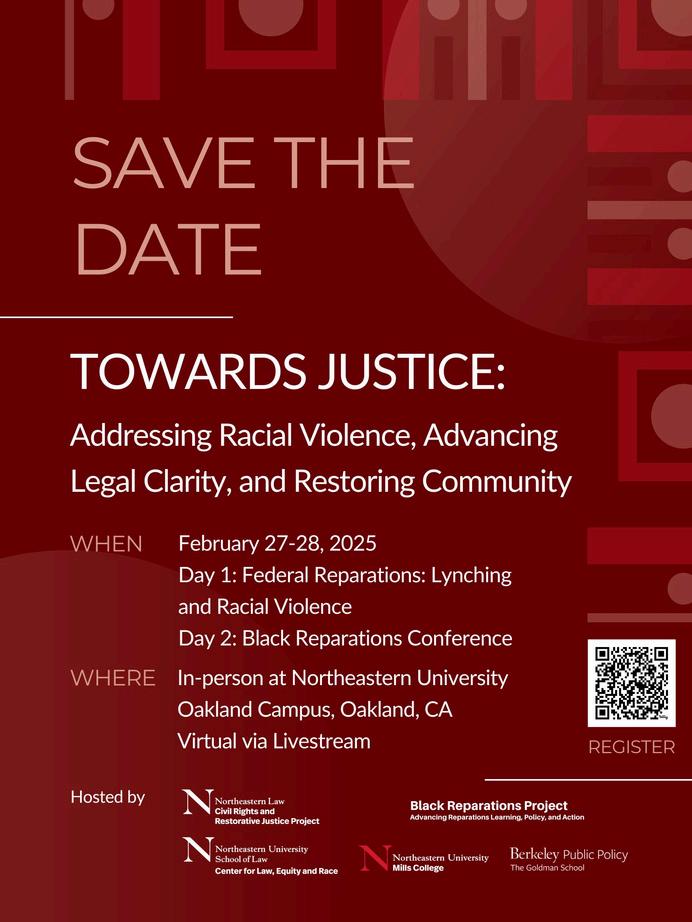
Black Reparations Tracking
BRP established a comprehensive online repository to support the growing field of Black reparations. This repository is a valuable resource for academic research, policy development, and community engagement. It compiles links to various California and national Black reparations initiatives, with the aim of serving as a resource for academic research, facilitating student access to research projects, internships, and job opportunities, helping researchers and policymakers gain a better understanding of the policy landscape surrounding Black reparations, identifying gaps and opportunities for technical assistance and university partnerships, sharing lessons learned, and facilitating stakeholder connections.
The repository includes a wide range of categories such as Black Reparations Project Reports, Black Reparations Project in the News, International Reparations Models, Reparations Task Forces, Committees, and Commissions in California, Reparations Legislation in California, Reparations Reports in California, Reparations Task Forces, Commissions, and Committees in the U.S., Reparations Legislation in the U.S., Reparations Reports in the U.S., Reparations Toolkits in the U.S., Reparations Tracking and Advocacy Organizations, Reparative Efforts in Higher Education, and Reparative Philanthropy. We encourage organizations involved in Black reparations to get linked to our repository by emailing us at blackreparationsproject@northeastern.edu.
Explore the BRP Information Repository and join us in advancing the cause of reparative justice, use the QR Code above or view here: https://reparations.sites.northeastern.edu/reparations-tracking/
Valued Partnerships
We are truly grateful for the continued support from our valued partners, thank you for supporting our work on this journey!
Legacy BRP Builders
Imani N. Karpowich-Smith, Magda Cooney, Dr. Mark Henderson, Sarah Bohl, Yeaye Stemn, Alec Edges, Sophie Kelsey, Zamora Zamora, Carrie Maultsby-Lute
Partner Organizations and Initiatives
Mills College at Northeastern University Dean’s Office
Mills College at Northeastern University ADEIB and Faculty Research Initiatives
Mills College at Northeastern University Business and Social Sciences Unit
Goldman School of Public Policy
Northeastern University School of Law Civil Rights and Restorative Justice Project and Center for Law, Equity and Race
Northeastern University African Studies
Northeastern University John D. O'Bryant African American Institute Stupski Foundation Liberation Ventures
SupportOurWork
Financial challenges persist as most community and government clients cannot fully fund our technical services. We urgently need long-term support for student compensation, technology services, and travel and programming costs. Additionally, as a predominantly Black, woman-led organization, securing equitable compensation for our dedicated team remains a critical priority.
The Black Reparations Project promotes education and research on Black reparations policies in California and across the nation, grounded in joy, healing, love, and collective liberation. Specializing in policy analysis and implementation, we focus on the planning, challenges, and successes of reparations efforts. Our work elevates reparations discourse through learning opportunities, collaboration with movement leaders, and rigorous academic support. Your donation supports our mission to advance this vital work.
To support our work, use the QR Code above or click here: https://reparations.sites.northeastern.edu/reparations-tracking/
Mailing Address:
500 Macarthur Blvd, Oakland, CA 94163
Email: Blackreparationsproject@neu.edu
Website: https://reparations.sites.northeastern.edu/
Social media: @Blackreparationsproject
